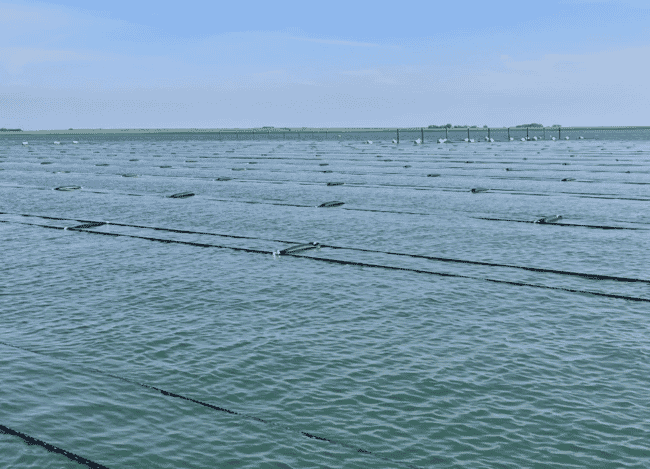
In the EU, most seaweed farms are typically small, manually cultivating a limited number of species on traditional rope systems in sheltered areas. As a result, most of the seaweeds available in the European market are imported from Asia. The relative underdevelopment of this industry leaves plenty room for a strong growth of seaweed production in European waters, as this sector has strong potential in sectors including food and feed, bioactives, biomaterials and bioenergy. The AlgaeDemo project, with the support of the European Maritime Fisheries and Aquaculture Fund (EMFAF) proposes to make seaweed cultivation a viable economic activity, bringing it to an industrial and commercial scale, while ensuring the sustainability of the industry.
Operating in the Oosterschelde in the Netherlands, AlgaeDemo aims to demonstrate that the deployment, operation and testing of a large-scale seaweed farm is a viable economic model.
In first place, the right cultivar for the location was selected, then mechanically seeded and will be harvested on advanced large-scale textile cultivation substrates. By applying a state-of-the-art autonomous underwater vehicle (AUV) for monitoring the macroalgae growth and anchoring conditions, a largely automated and highly reliable seaweed farm is built to reduce costs, risk to people and property and contribute to a healthier ocean.
Key drivers to make the sector more profitable and competitive are:
- Technologies such as technical textiles, on which seaweeds are cultivated.
- Advanced marine technologies such as automated cleaning/seeding/harvesting modules with Autonomous Underwater Vehicles (AUVs).
- Open sea solid mooring/anchoring techniques.
Last but not least, AlgaeDemo aims to illustrate the positive ecological effects of large-scale seaweed farming, as seaweed captures CO2, phosphates and nitrates, thus contributing to more healthy oceans.
In the future, seaweed cultivation will become increasingly important, with a high potential for growth and job creation. In fact, improved market readiness will attract European industry actors to invest in this new profitable sector.
Moreover, this project can be replicated in all the regions where open water seaweed cultivation is possible, such as the west coast of France, the UK, or Belgium.




